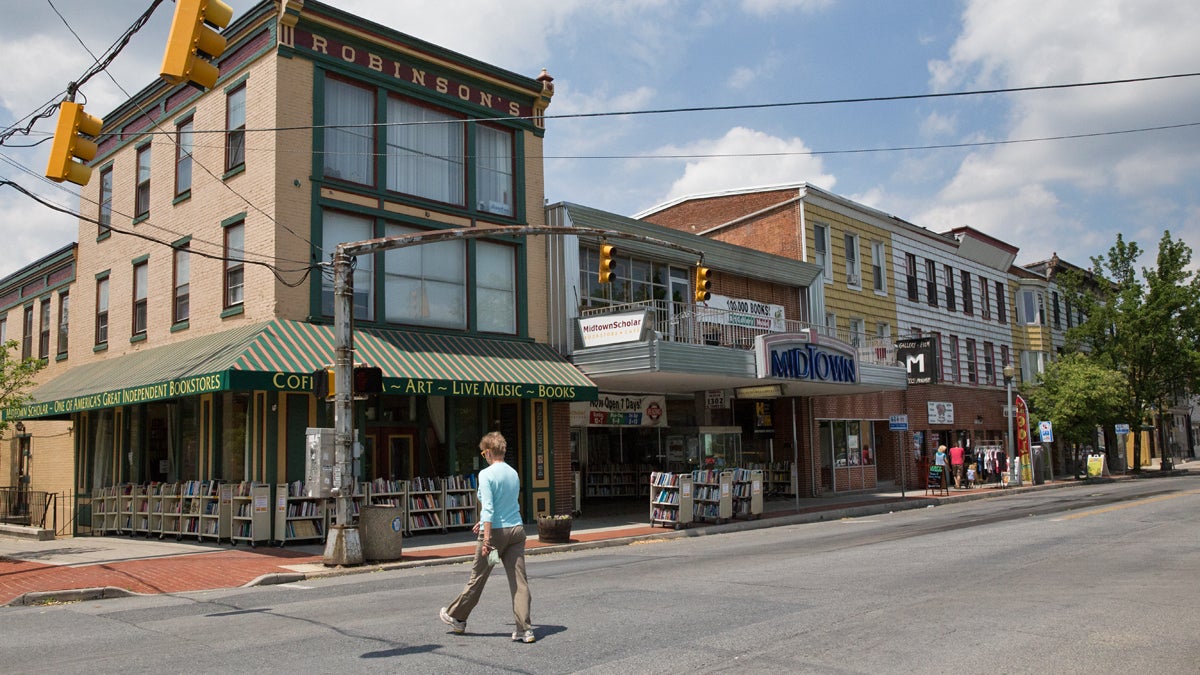Harrisburg is third Pennsylvania city to launch private social network site for neighborhoods
Listen
A woman crosses the street in Harrisburg’s Midtown neighborhood. Harrisburg is the latest Pennsylvania municipality to partner with Nextdoor, a social networking site, designed to foster communication within a neighborhood and between city agencies and residents. (Lindsay Lazarski/WHYY)
Cities are harnessing the ubiquity of smart phones and social media to make it easier to communicate with residents.
Harrisburg just became Pennsylvania’s eighth municipality (including small buroughs and big cities) to partner with Nextdoor for Public Agencies, and Reading iRequest was launched in the Pretzel City not too long ago. They are both private social networking sites, designed to foster communication within a neighborhood and between municipalities and neighborhood residents.
There are differences — not least of which is the cost, and that’s significant for distressed municipalities.
Nextdoor started as a neighbors-only Craigslist of sorts. Urban policy blog NextCity called it the “Facebook of neighborhoods.”
Although, users seem to tend toward more practical posts. At least those from my neighborhood in Harrisburg:
A Chihuahua lost, and found again. Electrician recommendations. New homes for old books. And so on, since 2011.
Each neighborhood forum is open only to people who can prove they actually live there. Residents have to verify their address with a phone or credit card number, a couple social security digits, or wait for an input code to arrive by mail.
(Nextdoor Senior City Strategist Joseph Porcelli says there’s never been a data breach. And sex offenders are prevented from joining by the company cross referencing registration databases, he says.)
In Harrisburg, there are 1,200 Nextdoor users.
“To put that in perspective, that is more people than vote in municipal elections sometimes,” says the city’s Mayor Eric Papenfuse.
Papenfuse kicked off Harrisburg’s partnership with Nextdoor for Public Agencies, which went live last year, with a news conference Thursday morning, and blasted residents already on Nextdoor with his first message just before noon. Later, the police chief and deputy fire chief did the same.
Since Nextdoor launched its Public Agencies arm in 2014, Philadelphia, Pittsburgh, Carlisle, Swarthmore, Paint Township, Castle Shannon and Lansdowne in Pennsylvania, and nearly 900 municipalities in other states have started using it to blast alerts to — and get feedback from — residents who sign up for the parent service.
And Nextdoor’s been adding neighborhoods at nearly triple the rate as the three years prior.
“As more cities come on board and people find out that cities are proactively communicating with their neighbors, letting them know when there’s going to be construction on their street or a community meeting to talk about an incident, people find that very valuable. So it’s meeting a need that hasn’t’ yet been able to be met through other platforms, so people just really appreciate it,” Porcelli says.
For public officials and their constituents, this is a way to ease and expedite their exchanges. The government can even send messages to select online neighborhoods, although it can’t see over the digital fences protecting each one.
The company plans to generate revenue, eventually, using ads, and possibly charging a transaction fee for payments between users made through the site, reports Government Technology magazine.
But it’s free for everyone involved, thanks to $210 million in venture capital.
Forbes reports just $6.5 million in startup money for Public Stuff, the company behind a variety of non-emergency reporting and communication apps in hundreds of municipalities. The borough of Media is one of them, and Philly has enlisted the aid of Public Stuff for the city’s 311 service.
Reading’s another.
The distressed city — where a high percentage of properties are untaxable and nearly half of residents are impoverished — paid $16,000 for Reading iRequest, which rolled out with zero fanfare in January.
Keystone Crossroads’ calls and emails to representatives for Public Stuff parent Accela for more information were not returned.
But the mayor’s Chief of Staff Eron Lloyd says the choice came after veting multiple options. Public Stuff’s interface is most compatible with Reading’s existing digital record system. And submissions from users do, in fact, become official records with an automatically-generated reference number, Lloyd says.
“The third largest city in Pennsylvania uses this system, so we figured it would scale well” for us, he says.
ReDesign Reading Executive Director Brian Kelly explains how the initiative between his nonprofit and City Hall works:
“You have a pothole. Most people ride right by the pothole, they curse the city, but they don’t necessarily report it to the city. With limited staff and fiscal restraints, most of the time the city doesn’t have the ability to go and inspect and find every pothole proactively. … So we’re saying: ‘How can we start to change that?’ Somebody has a smartphone, take a picture, load it right into the system, it gets logged in. The city has a certain amount of time, they have to respond.”
City operations manager Maria Kantner couldn’t quantify whether or how the app and its built-in accountability system has increased or expedited reporting and responses. Lloyd says that will be tough because Berks County started handling city calls about taxes and water and sewer service just as Reading officials prepared to launch iRequest.
But Kantner says the new app undoubtedly addresses what would otherwise be interpreted as inaction when noticeable results are delayed.
“Some things take time and we can see the action. It’s easy to see what action has been taken on it, and they receive updates,” Kantner says.
For Kelly, it’s not just about results, though.
“Is it going to change the community in a year, two years? No,” Kelly says. “But it’s starting to change the conversation, and that’s what we’re looking at.”
Editors note: This post has been updated to add details about iRequest’s costs.
WHYY is your source for fact-based, in-depth journalism and information. As a nonprofit organization, we rely on financial support from readers like you. Please give today.



